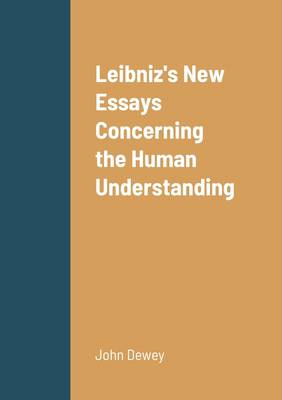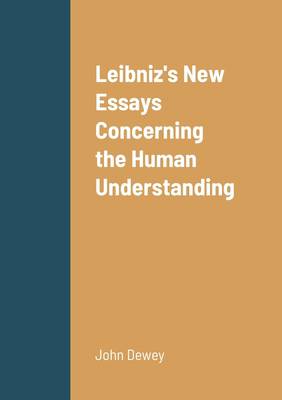
Door een staking bij bpost kan je online bestelling op dit moment iets langer onderweg zijn dan voorzien. Dringend iets nodig? Onze winkels ontvangen jou met open armen!
- Afhalen na 1 uur in een winkel met voorraad
- Gratis thuislevering in België vanaf € 30
- Ruim aanbod met 7 miljoen producten
Door een staking bij bpost kan je online bestelling op dit moment iets langer onderweg zijn dan voorzien. Dringend iets nodig? Onze winkels ontvangen jou met open armen!
- Afhalen na 1 uur in een winkel met voorraad
- Gratis thuislevering in België vanaf € 30
- Ruim aanbod met 7 miljoen producten
Zoeken
€ 41,95
+ 83 punten
Uitvoering
Omschrijving
Leibniz's New Essays on Human UnderstandingJohn Dewey "HE who knows me only by my writings does not know me," said Leibniz. These words-true, indeed, of every writer, but true of Leibniz in a way which gives a peculiar interest and charm to his life-must be our excuse for prefacing what is to be said of his "New Essays concerning the Human Understanding" with a brief biographical sketch. Gottfried Wilhelm Leibniz was born in Leipzig June 21, 1646. His father, who died when Leibniz was only six years old, was a professor in the university and a notary of considerable practice. From him the future philosopher seems to have derived his extraordinary industry and love of detail. Such accounts as we have of him show no traces of the wonderful intellectual genius of his son, but only a diligent, plodding, faithful, and religious man, a thoroughly conscientious husband, jurist, and professor. Nor in the lines of physical heredity can we account for the unique career of Leibniz by his mother's endowments. The fact, however, that she was patient in all trial, living in peace with her neighbors, anxious for unity and concord with all people, even with those not well disposed to her, throws great light upon the fundamental trait of Leibniz's ethical nature. As in so many cases, it is the inherited moral characteristics which form the basis of the intellectual nature. The love of unity which was a moral trait in Leibniz's mother became in him the hunger for a harmonious and unified mental world the father's devotion to detail showed itself as the desire for knowledge as minute and comprehensive as it was inter-related. Left without his father, he was by the advice of a discerning friend allowed free access to the library. Leibniz never ceased to count this one of the greatest fortunes of his life. Writing in after years to a friend, he says: - "When I lost my father, and was left without any direction in my studies, I had the luck to get at books in all languages, of all religions, upon all sciences, and to read them without any regular order, just as my own impulse led me. From this I obtained the great advantage that I was freed from ordinary prejudices, and introduced to many things of which I should otherwise never have thought.
Specificaties
Betrokkenen
- Auteur(s):
- Uitgeverij:
Inhoud
- Aantal bladzijden:
- 176
- Taal:
- Engels
Eigenschappen
- Productcode (EAN):
- 9781387873982
- Verschijningsdatum:
- 25/06/2022
- Uitvoering:
- Paperback
- Formaat:
- Trade paperback (VS)
- Afmetingen:
- 148 mm x 210 mm
- Gewicht:
- 235 g

Alleen bij Standaard Boekhandel
+ 83 punten op je klantenkaart van Standaard Boekhandel
Beoordelingen
We publiceren alleen reviews die voldoen aan de voorwaarden voor reviews. Bekijk onze voorwaarden voor reviews.











